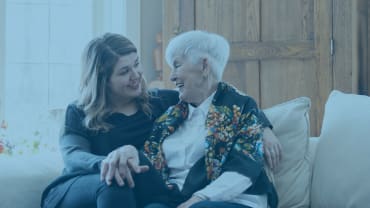Following the death of his father, David Bowie, Duncan Jones created a social media sensation by posting a link to a poignant letter by palliative care doctor Mark Taubert which praised Bowie for being an inspiration to millions battling life-ending illnesses. For Dr Taubert, Bowie's story "became a way for us to communicate very openly about death".
With this in mind, we turn to consider a statement which every individual can make for end of life care which is known as an 'advance directive' or 'living will'.
What is an advance directive?
An advance directive lets your family, carers and other healthcare professionals know whether or not you want to refuse specific treatments in the future. This means that those close to you or involved in your medical care will know your wishes if you are unable to make or communicate those decisions yourself.
An advance directive should not be confused with an 'advance statement'. An advance statement echoes the spirit of an advance directive, but it focuses on an individual's future care and treatment in the context of mental health.
What are the benefits of having an advance directive?
- An advance directive gives you a chance to tell your family and your healthcare team how you would wish to be treated.
- It can help to avoid disagreements within your family about your care and treatment and allows them to respect your wishes.
- It can remove the burden on others who may be asked to make crucial medical decisions about you, and reduces the chances of your loved ones worrying that they have not done the right thing.
- Some overall peace of mind in knowing that you have had the opportunity to voice your wishes.
What you need to know about making an advance directive
Not everyone wants to undergo invasive, life sustaining treatment for long periods if there is no prospect of recovery. An advance directive can help to prevent the use of various kinds of onerous medical procedures should you suffer an incurable or irreversible illness. It can also make your wishes clear on the use of antibiotics, hydration and artificial nutrition to prolong life, and the use of ventilators or participation in research.
Advance directives cannot be used to request particular treatment, ask for your life to be ended, or to nominate someone to decideyour treatment on your behalf. They simply allow you to give doctors guidance or instructions as to life-sustaining medical treatment should you be unable to do so.
If you do make one, it should be reviewed regularly to ensure that it continues to reflect your wishes. It is also important to make sure your family are aware of your decision.
Who can make one?
Advance directives can be made by anyone age16 or over, so long as they understand the nature and extent of the decision they are making.
Who do you involve?
An advance directive should be in writing, signed by you and witnessed by an independent adult. A copy should be given to your solicitor,close members of your family, your welfare attorney(s), your local GP, and any other healthcare professionals closely involvedwith your care.
Legal implications
In Scotland, an advance directive is not legally binding (unlike in England and Wales) but it is highly persuasive. Your healthcare team and family are far more likely to respect your wishes set out in an advance directive but it cannot be guaranteed.
In short
An advance directive provides a simple and useful means of continuing your right torefuse or make decisions about your treatment if you are no longer able to. This potentially removes a huge burden for your loved onesand allows you to communicatehow you wish to be treated.
And finally, in Dr Taubert's words "Thank you [David]...for your advance care planning (i.e. planning health and care decisions prior to things getting worse and before becoming unable to express them), I am certain you will have had a lot of ideas, expectations,prior decisions and stipulations. These may have been set out clearly in writing, near your bed at home, so that everyone who met you was clear on what you wanted, regardless of your ability to communicate. It is an area not just palliative care professionals, but in fact all healthcare workers want to provide and improve, so that it is less likely that any sudden health incidents will automatically result in a blue-light ambulance emergency room admission. Especially when people become unable to speak for themselves."
This blog was written by Lindsay Watson-0141 245 6217 or lindsay.watson@brodies.com
To find out more about advance directives please get in touch with your usual Brodies' contact or any of the following:
Alan Barr - 0131 656 0103 or alan.barr@brodies.com
Susanne Beveridge - 0131 656 0218 or susanne.beveridge@brodies.com
Norman Kennedy - 0141 245 6265 or norman.kennedy@brodies.com
Mark Stewart - 01224 392 282 or mark.stewart@brodies.com











